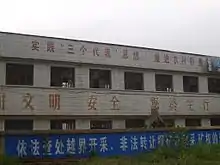Three Represents
The Three Represents or the important thought of Three Represents is a guiding socio-political theory within China credited to Jiang Zemin, which was ratified by the Chinese Communist Party (CCP) at the Sixteenth Party Congress in 2002. The Three Represents defines the role of the CCP, and stresses that the Party must always represent the requirements for developing China's advanced productive forces, the orientation of China's advanced culture and the fundamental interests of the overwhelming majority of the Chinese people.[1][2] Jiang Zemin first introduced his theory on 25 February 2000 while on an inspection tour in Maoming, Guangdong province.

| Three Represents | |||||||
|---|---|---|---|---|---|---|---|
| Simplified Chinese | 三个代表 | ||||||
| Traditional Chinese | 三個代表 | ||||||
| |||||||
| The important thought of Three Represents | |||||||
| Simplified Chinese | "三个代表"重要思想 | ||||||
| Traditional Chinese | "三個代表"重要思想 | ||||||
| |||||||
The three constituent parts mentioned in the quote above are as follows:
- "advanced productive forces", referring to economic production;
- "progressive course of China's advanced culture", referring to cultural development;
- and "the fundamental interests of the majority", referring to political consensus.
Certain segments within the CCP criticized the Three Represents as being un-Marxist and a betrayal of basic Marxist values. Supporters viewed it as a further development of socialism with Chinese characteristics.[4] Jiang disagreed with the assertion that his theories were not Marxist, and concluded that attaining the communist mode of production (as formulated by earlier communists) was more complex than had been realized; it was useless to try to force a change, as it had to develop naturally by following the economic laws of history.[5] The theory is most notable for allowing capitalists, officially referred to as the "new social strata", to join the party on the grounds that they engaged in "honest labour and work" and through their labour contributed "to build[ing] socialism with Chinese characteristics."[6]
One of the main goals of the Three Represents is to change the CCP into a governmental and more democratic party. This opens up the Party to "the overwhelming majority of the Chinese people", as well as businessmen and managers. This makes for a party that is much more attractive for a greater number of people. The Theory of the Three Represents is another expansion to what the government of China would define as "allies". Over the years, the number of people that could in fact still be defined as "class enemies" kept reducing, seeing how the number of people that belonged to the "wavering middle" (people that were not allies, but could in fact not threaten the Party's regime) increased.
References
Further reading
- Kuhn, Robert Lawrence (2011). How China's Leaders Think: The Inside Story of China's Past, Current and Future Leaders. John Wiley & Sons. ISBN 978-1118104255.
- On the “Three Represents”, a collection of speeches by Jiang Zemin
- Lewis, John W.; Xue Litai (2003). "Social Change and Political Reform in China: Meeting the Challenge of Success" (PDF). The China Quarterly. 176 (176): 926–942. doi:10.1017/S0305741003000559. Archived from the original (PDF) on 2 May 2005.
External links
- Three Represents - People's Daily
- On the Three Represents - International Department of Central Committee of CCP